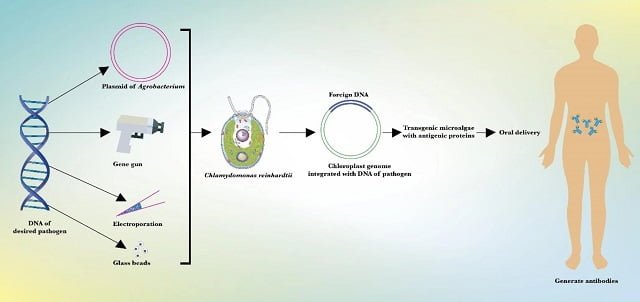
Edible vaccines have changed the paradigm and have gained acceptance worldwide, especially in developing countries. In order to produce edible vaccines, genes of interest must be inserted into plant cells using genetic engineering techniques.
Microalgae are one of the potential candidates for developing edible vaccines. Modifying microalgae as edible vaccines is gaining global attention, especially in the scientific world.
When microalgae are genetically modified to produce antigenic proteins, they can be consumed orally to generate antibodies against a particular pathogen.
Researchers from Catholicate College published a scientific review analyzing microalgae as a source of edible vaccines.
Microalgae as edible vaccines
Plastids are one of the main requirements for expressing vaccine antigens. Additionally, algae chloroplasts play a fundamental role in the expression of therapeutic proteins and possess certain remarkable characteristics that make them an important tool in biotechnology.
The first edible vaccine based on algae was a fusion product of foot-and-mouth disease virus particles and cholera toxin B. In this study, the transgenic chloroplast of Chlamydomonas reinhardtii was used for vaccine expression.
On the other hand, Renibacterium salmoninarum is a pathogenic bacterium that causes kidney disease in salmonids. C. reinhardtii was genetically modified to express antigens of this bacterium and fed to trout and rabbits, which then generated antibodies against this antigenic protein.
Advantages of algae vaccines
Unlike plants, algae biomass accumulation is extremely rapid, and the entire biomass can be used for vaccine production.
Furthermore, microalgae are resistant to animal pathogens, and the expression of heterologous proteins in microalgae is 10 to 100 times higher than that of plant-based vaccines.
Stay Always Informed
Join our communities to instantly receive the most important news, reports, and analysis from the aquaculture industry.
The recombinant antigen is retained in the algae cell wall for an extended shelf life of up to 20 months at room temperature without losing efficacy.
Compared to plants, microalgae can be produced in a medium containing only the necessary nutrients, eliminating the need for fertile soil.
Challenges in producing microalgae vaccines
The advantages of genetic engineering of algae genomes have accelerated the synthesis of therapeutic proteins. However, genetic instability and low expression have been observed in some strains.
Although many algae have been successfully transformed, stable transformants of Chlorella have been scarce for a long time. Chlorella is a promising green alga for the expression of recombinant proteins.
However, they are small and have a resistant cell wall, which hampers their effective use for recombinant protein expression due to the lack of genetic tools.
Another overwhelming challenge is that recombinant protein yields in algae systems are sometimes low compared to microbial platforms, but this can be overcome by using efficient promoters.
To date, only a few microalgae are commercially exploited for the production of edible vaccines.
Conclusion
According to the researchers, algae are well-designed platforms for producing antigens. “Most studies focused on the green microalga Chlamydomonas reinhardtii due to some peculiar characteristics,” they report.
They also report that studies are being conducted on microalgae to prepare a potential vaccine against the novel coronavirus.
“The future of edible vaccine techniques based on microalgae is very promising because they can be mass-produced in a limited time and are cost-effective,” they conclude.
Contact
Binoy T. Thomas
Phycotechnology laboratory
Post Graduate and Research Department of Botany
Catholicate college
Pathanamthitta, Kerala, 689645, India
Email: bttkripa@gmail.com
Reference (open access)
Jiji, M.G., Ninan, M.A., Thomas, V.P. et al. Edible microalgae: potential candidate for developing edible vaccines. Vegetos (2023). https://doi.org/10.1007/s42535-023-00636-y
Editor at the digital magazine AquaHoy. He holds a degree in Aquaculture Biology from the National University of Santa (UNS) and a Master’s degree in Science and Innovation Management from the Polytechnic University of Valencia, with postgraduate diplomas in Business Innovation and Innovation Management. He possesses extensive experience in the aquaculture and fisheries sector, having led the Fisheries Innovation Unit of the National Program for Innovation in Fisheries and Aquaculture (PNIPA). He has served as a senior consultant in technology watch, an innovation project formulator and advisor, and a lecturer at UNS. He is a member of the Peruvian College of Biologists and was recognized by the World Aquaculture Society (WAS) in 2016 for his contribution to aquaculture.







